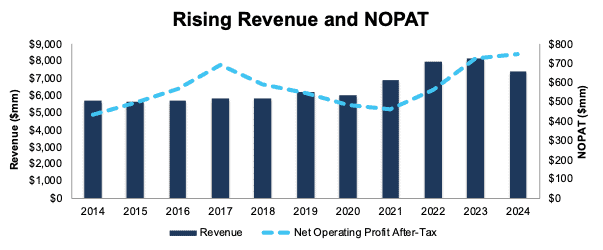This week’s surprise election of Pope Leo XIV, the first American pope, rocked prediction markets, where bettors saw massive payouts after odds heavily favored other candidates. The rise of political wagering on platforms such as Polymarket reflects growing interest in event-based speculation.
In recent years, the stock market has been a hotbed for speculation, with meme stocks, “to the moon”, and HODL taking the place of real fundamental analysis. However, our advice remains the same – don’t let noise and narrative change your diligent approach to investing.
Given the uncertainty and volatility in the market, it’s a great time to focus on companies with strong fundamentals and the cash flows to grow their dividends. We scoured over 3,000 stocks to find this month’s featured stock for our Dividend Growth Stocks Model Portfolio.
Below is an overview of this stock pick. It is not an in-depth Long Idea report, but it will give you a good understanding of how our research combines fundamental research with expectations investing.
We hope you enjoy this free stock pick. Feel free to share this report with friends and colleagues.
We update this Model Portfolio monthly. April’s Dividend Growth Model Portfolio was updated and published for clients on April 30, 2025.
Free Stock Feature April: Ingredion, Inc. (INGR: $137/share)
Ingredion has grown revenue and net operating profit after-tax (NOPAT) by 3% and 6% compounded annually, respectively, over the last decade. The company’s NOPAT margin increased from 8% in 2014 to 10% in 2024, while invested capital turns fell from 1.1 to 0.9 over the same time. Rising NOPAT margins are enough to offset falling invested capital turns and drive return on invested capital (ROIC) from 8% in 2014 to 9% in 2024.
Figure 1: Ingredion’s Revenue & NOPAT Since 2014
Sources: New Constructs, LLC and company filings
Free Cash Flow Supports Dividend Payments
Ingredion has increased its regular, quarterly dividend from $0.63/share in 1Q19 to $0.80/share in 1Q25. The quarterly dividend, when annualized, equals $3.20/share and provides a 2.3% dividend yield.
More importantly, Ingredion’s cumulative free cash flow (FCF) easily exceeds its dividend payments. From 2019 through 2024, Ingredion generated $2.6 billion (24% of current enterprise value) in FCF while paying $1.1 billion in dividends. See Figure 2.
Figure 2: Ingredion’s FCF vs. Dividends Since 2019
Sources: New Constructs, LLC and company filings
Companies with FCF well above dividend payments provide higher-quality dividend growth opportunities. On the other hand, dividends that exceed FCF cannot be trusted to grow or even be maintained.
INGR Is Undervalued
At its current price of $137/share, Ingredion has a price-to-economic book value (PEBV) ratio of 0.8. This ratio means the market expects Ingredion’s NOPAT to permanently fall 20% from current levels. This expectation seems overly pessimistic given that Ingredion has grown NOPAT by 7% and 6% compounded annually over the past five and ten years, respectively.
Even if Ingredion’s:
- NOPAT margin falls to 8% (below ten-year average of 9% and 2024 margin of 10%) and
- revenue grows 3% compounded annually (equal to CAGR over the last ten years) for the next decade,
the stock would be worth $172/share today – a 25% upside. In this scenario, Ingredion’s NOPAT would grow just <1% compounded annually through 2034. Contact us for the math behind this reverse DCF scenario.
Add in Ingredion’s 2.3% dividend yield and a history of dividend growth, and it’s clear why this stock is in April’s Dividend Growth Stocks Model Portfolio.
Critical Details Found in Financial Filings by Our Robo-Analyst Technology
Below are specifics on the adjustments we make based on Robo-Analyst findings in Ingredion’s 10-K:
Income Statement: we made just under $300 million in adjustments with a net effect of removing over $100 million in non-operating expense. Clients can see all adjustments made to Ingredion’s income statement on the GAAP Reconciliation tab on the Ratings page on our website.
Balance Sheet: we made over $3 billion in adjustments to calculate invested capital with a net increase of over $1 billion. The most notable adjustment was for other comprehensive income. See all adjustments made to Ingredion’s balance sheet on the GAAP Reconciliation tab on the Ratings page on our website.
Valuation: we made just under $3 billion in adjustments, with a net effect of decreasing shareholder value by under $2 billion. Apart from total debt, the most notable adjustment to shareholder value was for excess cash. See all adjustments to Ingredion’s valuation on the GAAP Reconciliation tab on the Ratings page on our website.
This article was originally published on May 9, 2025.
Disclosure: David Trainer, Kyle Guske II, and Hakan Salt receive no compensation to write about any specific stock, style, or theme.
Questions on this report or others? Join our online community and connect with us directly.


